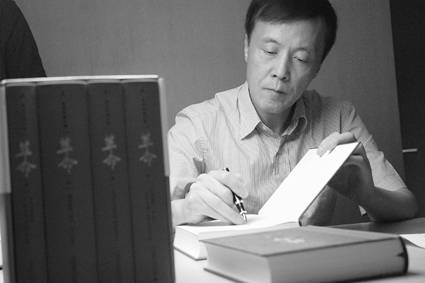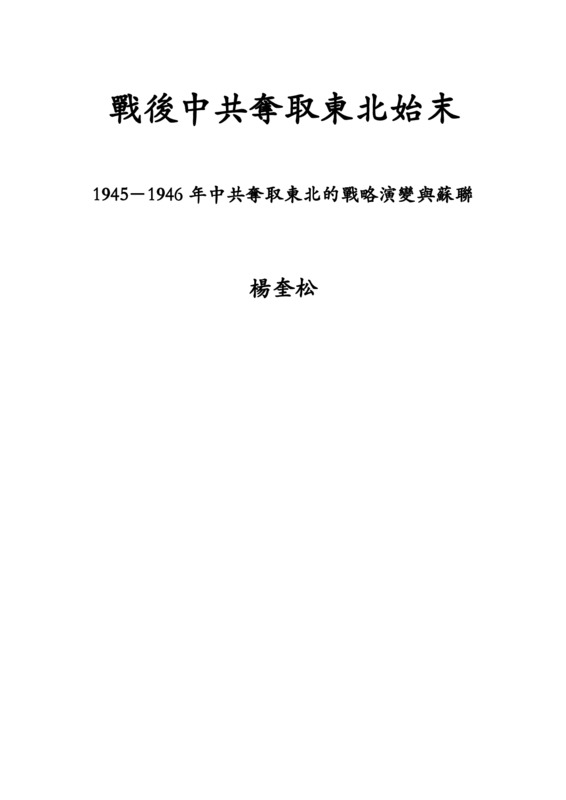Explore the collection
Showing 7 items in the collection
7 items
Article
Facts of the 1958-1962 Disaster in Fengyang County, Anhui Province
The author of this book, Luo Pinghan, is a native of Anhua County, Hunan Province. He graduated from the Party History Department of Renmin University of China and served as director and professor of the Party History Teaching and Research Department of the Party School of the Central Committee of the Communist Party of China. This book was published by Fujian People's Publishing House in 2003.
With Mao Zedong's affirmation, the system of people's communes was rapidly promoted across the country in 1958. At that time, the people's commune was both a production organization and a grassroots political power. Its rise and fanatical development are closely related to the subsequent Great Famine.
As a scholar within the system, the author’s view of history also belongs to orthodox ideology. Although this book is narrated from the official ideology of the CCP, it uses rich and detailed historical materials to comprehensively and systematically introduce the history of the People's Communes, giving it a reference value for a comprehensive understanding of this movement.
Article
Memorandum on "Three Years of Natural Disasters"
The years 1959-1961 were very unusual in the history of disasters in China and the world in the 20th century. Anyone who has experienced it will recall the starvation years and the days when people starved to death everywhere. However, due to official concealment and denial, the number of people who died in this disaster has never been officially announced.
The purpose of Jin Hui's article is to estimate the number of unnatural deaths during the three years of the 1959-1961 disaster in China. Based on public data released by the authoritative National Bureau of Statistics in China Jin concludes that about 40 million people died, which roughly matches studies by foreign scholars, who have estimated up to 45 million.
Article
Yang Kuisong: A Study of New China's "Counter-Revolutionary Suppression" Campaign
How many people were "killed," "imprisoned," and "controlled" in the whole "anti-revolution" campaign? Mao Zedong later said that 700,000 people were killed, 1.2 million were imprisoned, and 1.2 million were put under control. Mao's statement was naturally based on a report made in January 1954 by Xu Zirong, deputy minister of public security. Xu reported at the time that since the anti-revolution campaign, the country had arrested more than 262,000, of which "more than 712,000 counter-revolutionaries were killed, more than 12,900,000 were imprisoned, and 1,200,000 were put under control, and more than 380,000 were released through education because their crimes were not considered serious after their arrest." (3) Taking the figure of 712,000 executed, it already amounts to one and two-fourths thousandths of one percent of the country's 500 million people at that time. This figure is obviously much higher than the one-thousandth of a percent level originally envisioned by Mao Zedong.
Article
Yang Kuisong: The Beginning and End of the CCP's Seizure of the Northeast after the War
The occupation of the Northeast was key to the CCP's success in seizing power in 1949. The author of this book, Yang Kuisong, is a professor and doctoral director of the Department of History at East China Normal University, and a researcher at the Institute of Modern History at the Chinese Academy of Social Sciences. This book describes the CCP's taking of the Northeast as well as the competition between the U.S. and the Soviet Union at that time. After reading it, you will understand: how the Soviet Union played a key role in the CCP's occupation of the Northeast.
Article
China Labour Bulletin Report Series on Labor Rights Protection in China
On June 12, 2025, the Hong Kong–based NGO China Labour Bulletin (CLB) announced its dissolution. This marks yet another Chinese civil society organization that ceased operations following the implementation of the Hong Kong National Security Law. Founded in 1994, CLB was dedicated to promoting the Chinese labor movement and had long focused on labor rights in China. Headquartered in Hong Kong, its founder Han Dongfang was a workers’ leader during the 1989 Tiananmen Democracy Movement and one of the founders of the Beijing Workers’ Autonomous Federation.
Over the years, China Labour Bulletin published dozens of reports in Chinese and English on China’s labor movement, addressing issues related to migrant workers, food delivery couriers, women workers, child labor, coal mining, and pneumoconiosis, among others. Following the organization’s dissolution, the China Labour Bulletin website was also taken offline.
In response, the China Unofficial Archives website immediately downloaded and preserved 80 Chinese- and English-language reports from the site. The following 26 reports are studies on the labor rights protection in China published between 2004 and 2024, including titles such as “Research Report on China’s Food Delivery Industry,” “Labor Rights in the Construction Industry,” “Healthcare Workers’ Rights Report,” and “Workers’ Rights in the Manufacturing Sector,” among others.
Article
China Labour Bulletin Report Series on Workers' Movement
On June 12, 2025, the Hong Kong–based NGO China Labour Bulletin (CLB) announced its dissolution. This marks yet another Chinese civil society organization that ceased operations following the implementation of the Hong Kong National Security Law. Founded in 1994, CLB was dedicated to promoting the Chinese labor movement and had long focused on labor rights in China. Headquartered in Hong Kong, its founder Han Dongfang was a workers’ leader during the 1989 Tiananmen Democracy Movement and one of the founders of the Beijing Workers’ Autonomous Federation.
Over the years, China Labour Bulletin published dozens of reports in Chinese and English on China’s labor movement, addressing issues related to migrant workers, food delivery couriers, women workers, child labor, coal mining, and pneumoconiosis, among others. Following the organization’s dissolution, the China Labour Bulletin website was also taken offline.
In response, the China Unofficial Archives website immediately downloaded and preserved 80 Chinese- and English-language reports from the site. The following 15 reports are observation reports on China's workers' movement.
文章
China Labour Bulletin Report Series on Trade Union Reform
On June 12, 2025, the Hong Kong–based NGO China Labour Bulletin (CLB) announced its dissolution. This marks yet another Chinese civil society organization that ceased operations following the implementation of the Hong Kong National Security Law. Founded in 1994, CLB was dedicated to promoting the Chinese labor movement and had long focused on labor rights in China. Headquartered in Hong Kong, its founder Han Dongfang was a workers’ leader during the 1989 Tiananmen Democracy Movement and one of the founders of the Beijing Workers’ Autonomous Federation.
Over the years, China Labour Bulletin published dozens of reports in Chinese and English on China’s labor movement, addressing issues related to migrant workers, food delivery couriers, women workers, child labor, coal mining, and pneumoconiosis, among others. Following the organization’s dissolution, the China Labour Bulletin website was also taken offline.
In response, the China Unofficial Archives website immediately downloaded and preserved 80 Chinese- and English-language reports from the site. The following 18 reports are studies concerning trade union reform in China.




